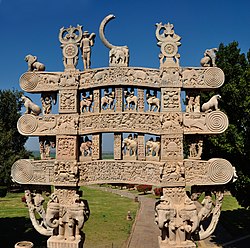History of India (1947–present)







== History of India (1947–present) ==
The history of India from 1947 to the present encompasses the period following the Partition of India and the subsequent independence of the Republic of India from British rule. This era is marked by significant political, social, and economic changes, as well as India's emergence as a major player on the global stage.
Independence and Partition[edit]
On August 15, 1947, India gained independence from the British Empire, leading to the creation of two separate nations: India and Pakistan. The Partition of India resulted in widespread violence, mass migrations, and significant loss of life. Jawaharlal Nehru became the first Prime Minister of India, and Mahatma Gandhi played a crucial role in the independence movement.
Early Republic (1947–1964)[edit]
The early years of the Republic of India were marked by efforts to stabilize the nation and implement democratic governance. The Constitution of India was adopted on January 26, 1950, establishing India as a sovereign, socialist, secular, and democratic republic. Nehru's government focused on industrialization, land reforms, and the establishment of educational institutions.
Nehru-Gandhi Era (1964–1984)[edit]
After Nehru's death in 1964, Lal Bahadur Shastri briefly served as Prime Minister until his sudden death in 1966. Indira Gandhi, Nehru's daughter, then became Prime Minister. Her tenure saw significant events such as the Green Revolution, the Emergency (India), and the Indo-Pakistani War of 1971, which led to the creation of Bangladesh.
Economic Liberalization (1991–present)[edit]
In 1991, under the leadership of Prime Minister P. V. Narasimha Rao and Finance Minister Manmohan Singh, India initiated a series of economic reforms aimed at liberalizing the economy. These reforms included reducing trade barriers, deregulating industries, and encouraging foreign investment. The liberalization policies led to rapid economic growth and the emergence of India as a global economic power.
21st Century[edit]
The 21st century has seen India continue to grow economically and politically. The country has faced challenges such as terrorism, climate change, and social inequality, but has also made significant strides in technology, space exploration, and international diplomacy. The rise of the Bharatiya Janata Party (BJP) and the leadership of Narendra Modi have further shaped the contemporary political landscape.
Related Pages[edit]
- Partition of India
- Jawaharlal Nehru
- Indira Gandhi
- Green Revolution
- Emergency (India)
- Indo-Pakistani War of 1971
- Economic liberalization in India
- Narendra Modi
- Bharatiya Janata Party
Categories[edit]
| History of India |
|---|
 |
|
|
Ad. Transform your life with W8MD's Budget GLP-1 injections from $75


W8MD offers a medical weight loss program to lose weight in Philadelphia. Our physician-supervised medical weight loss provides:
- Weight loss injections in NYC (generic and brand names):
- Zepbound / Mounjaro, Wegovy / Ozempic, Saxenda
- Most insurances accepted or discounted self-pay rates. We will obtain insurance prior authorizations if needed.
- Generic GLP1 weight loss injections from $75 for the starting dose.
- Also offer prescription weight loss medications including Phentermine, Qsymia, Diethylpropion, Contrave etc.
NYC weight loss doctor appointmentsNYC weight loss doctor appointments
Start your NYC weight loss journey today at our NYC medical weight loss and Philadelphia medical weight loss clinics.
- Call 718-946-5500 to lose weight in NYC or for medical weight loss in Philadelphia 215-676-2334.
- Tags:NYC medical weight loss, Philadelphia lose weight Zepbound NYC, Budget GLP1 weight loss injections, Wegovy Philadelphia, Wegovy NYC, Philadelphia medical weight loss, Brookly weight loss and Wegovy NYC
|
WikiMD's Wellness Encyclopedia |
| Let Food Be Thy Medicine Medicine Thy Food - Hippocrates |
Medical Disclaimer: WikiMD is not a substitute for professional medical advice. The information on WikiMD is provided as an information resource only, may be incorrect, outdated or misleading, and is not to be used or relied on for any diagnostic or treatment purposes. Please consult your health care provider before making any healthcare decisions or for guidance about a specific medical condition. WikiMD expressly disclaims responsibility, and shall have no liability, for any damages, loss, injury, or liability whatsoever suffered as a result of your reliance on the information contained in this site. By visiting this site you agree to the foregoing terms and conditions, which may from time to time be changed or supplemented by WikiMD. If you do not agree to the foregoing terms and conditions, you should not enter or use this site. See full disclaimer.
Credits:Most images are courtesy of Wikimedia commons, and templates, categories Wikipedia, licensed under CC BY SA or similar.
Translate this page: - East Asian
中文,
日本,
한국어,
South Asian
हिन्दी,
தமிழ்,
తెలుగు,
Urdu,
ಕನ್ನಡ,
Southeast Asian
Indonesian,
Vietnamese,
Thai,
မြန်မာဘာသာ,
বাংলা
European
español,
Deutsch,
français,
Greek,
português do Brasil,
polski,
română,
русский,
Nederlands,
norsk,
svenska,
suomi,
Italian
Middle Eastern & African
عربى,
Turkish,
Persian,
Hebrew,
Afrikaans,
isiZulu,
Kiswahili,
Other
Bulgarian,
Hungarian,
Czech,
Swedish,
മലയാളം,
मराठी,
ਪੰਜਾਬੀ,
ગુજરાતી,
Portuguese,
Ukrainian
